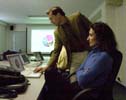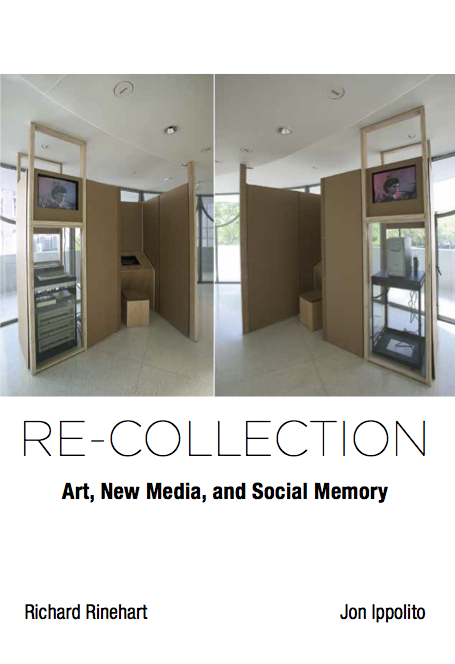biographies for jon ippolito
You can find more information about Jon at his
home page.
Keywords
new media; contemporary art; networks; participatory culture; intellectual property and the Internet; preservation; digital humanities; digital preservation; digital curation; generative AI; AI and creativity; AI and education
1 sentence, 4 words, 20 characters, zipped
Old school new media
1 sentence, 18 words, 90 characters, zen
Jon Ippolito would rather be judged by what he says today than what he's done in the past.
1 sentence, 26 words, 161 characters, laconic
A footsoldier in the battle between network and hierarchic culture, Jon Ippolito is an artist, curator, and
co-founder of Still Water at the University of Maine.
1 sentence, 39 words, 241 characters, concise
Professor of New Media and Director of the Digital Curation program at the University of Maine. Cofounder of the
Variable Media Network and Learning With AI; former Guggenheim curator; co-author of books At the Edge of Art
and Re-collection.
1 sentence, 37 words, 256 characters, social
How does tech empower and frustrate creators—writers, programmers, media makers—and how do we keep their work alive in the long run? UMaine Professor of New Media, Director of Digital Curation; former Guggenheim Curator of Media Art https://jonippolito.net
2 sentences, 47 words, 315 characters, white-collar
Jon Ippolito is Professor of New Media and Director of the Digital Curation program at the University of Maine. His current projects--including the Variable Media Network, ThoughtMesh, and his co-authored books At the Edge of Art and Re-collection--aim to expand the art world beyond its traditional preoccupations.
2 sentences, 58 words, 385 characters, blue-collar
One of many footsoldiers in the battle between network and hierarchic culture, Jon Ippolito is an artist, curator, and co-founder of the Still Water lab at the University of Maine. His current projects--including Learning With AI, the Variable Media Network, and his co-authored books At the Edge of Art and Re-collection--aim to expand academia and the art world beyond their traditional preoccupations.
3 sentences, 77 words, 496 characters, irreverent
Jon Ippolito (three.org/ippolito) has made a career out of pursuing vocations for which he is drastically underqualified. Following short-lived stints as a dancer and astrophysicist, he has co-created online artworks seen at the Walker Art Center and ZKM, curated exhibitions of video art and virtual reality at the Guggenheim, and published a regular column in ArtByte magazine. Although a full professor, he could not match his father's feat of attaining the same rank as a high-school dropout.
4 sentences, 99 words, 655 characters, academic
Jon Ippolito is a new media artist, writer, and curator who builds networks to help creative people battle tech monopolies, academic insularity, and planned obsolescence. Winner of Tiffany, Lannan, American Foundation, and the inaugural Thoma Digital Art award, he co-founded the University of Maine's Digital Curation program, a digital badges platform, and the Learning With AI toolkit for adapting to a post-ChatGPT world. Ippolito has given over 200 presentations, co-authored the books At the Edge of Art and Re-collection: Art, New Media, and Social Memory, and published 70 chapters and articles in periodicals from Artforum to the Washington Post.
4 sentences, 123 words, 768 characters, art-oriented
The inaugural winner of the Thoma Arts Writing prize, Jon Ippolito has exhibited artwork with collaborative teammates Janet Cohen and Keith Frank at venues such as the Walker Art Center and ZKM/Center for Art and Media Karlsruhe. As Associate Curator of Media Arts at the Guggenheim Museum, he curated Virtual Reality: An Emerging Medium and, with John G. Hanhardt, The Worlds of Nam June Paik. Ippolito's critical writing has appeared in periodicals ranging from Flash Art and the Art Journal to the Washington Post. At the Still Water lab co-founded with Joline Blais, Ippolito has worked on three projects--the Variable Media Network, ThoughtMesh, and the books At the Edge of Art and Re-collection--that aim to expand the art world beyond its traditional confines.
4 sentences, 133 words, 872 characters, AI-oriented
Jon Ippolito is an artist, writer, and curator who teaches New Media and Digital Curation at the University of Maine. Winner of Tiffany, Lannan, American Foundation, and Thoma awards, Ippolito is co-founder of the Variable Media Network for preserving new media art, UMaine's Digital Curation and Just-in-Time Learning programs. His AI resources for educators include the Learning With AI toolkit, AI IMPACT RISK framework, and What Uses More footprint calculator. Ippolito has given over 200 presentations, co-authored the books At the Edge of Art and Re-collection: Art, New Media, and Social Memory, and published 90 chapters and articles in periodicals from Artforum to the Washington Post. His AI focus is creators—writers, programmers, and media makers—and how the technical, aesthetic, and legal ramifications of generative AI empower and frustrate them.
7 sentences, 137 words, 913 characters, curatorial
Jon Ippolito (@jonippolito) is a new media artist, writer, and curator whose work has been recognized with awards from the Thoma, Tiffany, Lannan, and American Foundations. At the Guggenheim, he curated the first Internet commissions collected by a museum, curated the first art museum exhibition of virtual reality, and co-curated the 2000 Nam June Paik retrospective. Outspoken about the dangers of technological obsolescence and our shrinking public commons, he has published in periodicals ranging from the Art Journal to the Washington Post and chapters in over 20 anthologies. His books include At the Edge of Art (Thames & Hudson 2006) with Joline Blais and Re-collection: Art, New Media, and Social Memory (MIT 2014) with Richard Rinehart. Ippolito is Professor of New Media at the University of Maine, where he directs an all-online graduate Digital Curation program (https://DigitalCuration.UMaine.edu).
4 sentences, 146 words, 895 characters, self-congratulatory
Jon Ippolito is an artist, writer and curator born in Berkeley, California in 1962 who turned to making art after failing as an astrophysicist. After applying for what he thought was a position as a museum guard, Jon was hired in the curatorial department of the Guggenheim, New York, where in 1993 he curated Virtual Reality: An Emerging Medium and subsequent exhibitions that explore the intersection of contemporary art and new media. In 2002 Jon joined the faculty of the University of Maine's New Media Department, where with Joline Blais he co-founded Still Water, a lab devoted to studying and building creative networks. His writing on the cultural and aesthetic implications of new media earned him the inaugural Thoma Arts Writing prize, and has appeared in The Washington Post, Art Journal and in his co-authored books At the Edge of Art and Re-collection. More at jonippolito.net.
7 sentences, 168 words, 1086 characters, gloating
Jon Ippolito is a new media artist, writer, and curator whose work has been recognized with awards from the Thoma, Tiffany, Lannan, and American Foundations. At the Guggenheim he curated the first art museum exhibition of virtual reality and the 2000 Nam June Paik retrospective with John G. Hanhardt. As Professor of New Media at the University of Maine, Ippolito has founded a peer-to-peer digital badges initiative and a graduate Digital Curation program. At the Still Water lab co-founded with Joline Blais, he helped build social software such as the Variable Media Questionnaire, The Pool, ThoughtMesh, the Cross-Cultural Partnership, and Learning With AI. In over 200 presentations, Ippolito has spoken out on copyright maximalism, academic insularity, and technological obsolescence. He has published articles in periodicals ranging from the Art Journal to the Washington Post and chapters in over 20 books. Ippolito co-authored the book At the Edge of Art (Thames & Hudson 2006) with Blais and Re-collection: Art, New Media, and Social Memory (MIT 2014) with Richard Rinehart.
8 sentences, 307 words, 1915 characters, no holds barred
Jon Ippolito hopes building networks will help keep digital culture alive and kicking--but he has his hands full in today's climate of unfettered media monopolies, accelerated obsolescence, and looming co-optation by academia. He is the digital doyen of The Variable Media Network, an international consortium of museums and archives that devises medium-independent strategies to preserve new media art. As grand vizier of The Open Art Network and Learning With AI, Ippolito works with digital artists and academics to promote an open architecture for the Internet and digital media. As chief constable of the Still Water lab at the University of Maine, he works with Co-director Joline Blais to enforce an expansive definition of networked art in the academia and the art world, as argued in their 2006 book At the Edge of Art. The recipient of Tiffany, Lannan, and American Foundation awards, he was named in 2015 the inaugural winner of the Thoma Arts Writing prize. Ippolito has exhibited artwork with collaborative teammates Janet Cohen and Keith Frank at the Walker Art Center, ZKM/Center for Art and Media Karlsruhe, Harvard's Carpenter Center, and the Yale Art and Architecture Gallery. As Associate Curator of Media Arts at the Guggenheim Museum, he has curated Virtual Reality: An Emerging Medium and, with John G. Hanhardt, The Worlds of Nam June Paik. Ippolito's critical writing has appeared in periodicals such as the Art Journal, Artforum, Flash Art, the Washington Post, and in his regular column for ArtByte magazine. He and his work have been cited in a dozen New York Times and a dozen Wired articles, but that didn't stop his tenure committee from asking why he hadn't published in more academic journals. His book Re-collection, co-authored with Richard Rinehart, argues that digital heritage of the last 30 years will be lost to history without a revolutionary approach to preserving culture.
Other languages
Portuguese
Jon Ippolito é artista, escritor e curador nascido em Berkeley, Califórnia, em 1962, que acabou
fazendo arte depois de falhar como astrofísico. Depois de ter se inscrito para um posto que ele
acreditava ser o de guarda do museu, Jon foi contratado pelo departamento de curadorias do Guggenheim, Nova
York, onde ele curou Virtual Reality: An Emerging Medium [Realidade Virtual: Um Meio Emergente] e
subsequentemente exposições que exploravam a interseção da arte contemporânea e das
novas mídias. Em 2002 Jon passou a ocupar a cadeira de professor no departamento de Novas Mídias
da Universidade de Maine, onde com a colaboração de Joline Blais fundou o laboratório Still
Water, devotado ao estudo e à construção de redes criativas. Seus textos sobre as
implicações estéticas e culturais das novas mídias foram publicadas nos jornais The
Washington Post, Art Journal e em diversas revistas de arte. Para saber mais three.org/ippolito.






















